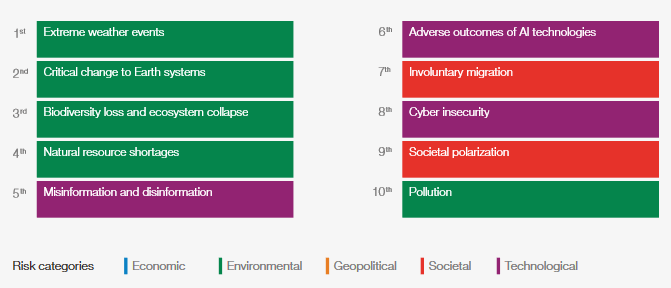The World Economic Forum’s (WEF) Global Risks Report is an annual publication that identifies the key risks the world could face over the next decade.
This year’s WEF Global Risks Report 2024, among other topics such as misinformation and disinformation or societal polarization, highlights the critical importance of climate-related issues, emphasizing them as the most severe long-term risks humanity faces. As businesses strive for sustainability, understanding these risks is paramount for strategic planning and global operations. The report is based on the Global Risks Perception Survey (GRPS), a survey of more than 1,000 experts and decision-makers from various sectors and regions.
The following paragraphs shortly summarize the key climate-related topics of this year’s report.
Extreme Weather Events & Earth Systems
The report underscores extreme weather events as a top concern. With increasing frequency and intensity, these events disrupt supply chains, damage infrastructure, and impact resource availability. Companies must develop robust disaster response strategies and invest in resilient infrastructure to mitigate these risks.
Critical changes to Earth’s systems are also flagged as a significant threat. This includes the alarming rate of global warming and its cascading effects on ecosystems. Businesses are encouraged to support initiatives that aim to stabilize these systems and to integrate climate science into their decision-making processes.
Biodiversity Loss & Resource Scarcity
The loss of biodiversity and the potential collapse of ecosystems present profound challenges. The interdependence of species and the services they provide are vital for business operations. Companies can contribute by adopting practices that protect natural habitats and promote biodiversity.
Natural resource shortages are anticipated to become more acute, driven by climate change and population growth. Sustainable resource management and the transition to circular economies are essential strategies for businesses to ensure long-term viability.
Collaborative Efforts
The interconnectedness of global risks necessitates a collaborative approach to risk management. The WEF report calls for multi-stakeholder engagement to address the complex challenges posed by climate change. Businesses have a crucial role to play in this collective action, driving innovation and leading by example in the transition to a sustainable future.
The following figure shows the top ten long-term risks (10 years) found by the GRPS and highlights the severity of climate-related risks. Five out of the top ten most severe global long-term risks are environmental risks, four of them ranking with the highest severity.

If you and your company want to make an impact and catch up on climate action and disclosure, then you could get in contact with one our experts at DFGE via mail () or phone (+49 819 29973320). Together with us you will take the next step with a carbon footprint calculation, the conceptualization of an impactful climate strategy or guidance on CSR reportings and ratings like CDP and EcoVadis.
Source:
Global Risks Report 2024 | World Economic Forum: https://www.weforum.org/publications/global-risks-report-2024/









